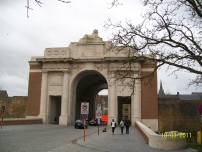| First Name: | Edward George | Last Name: | WISE | |
|---|---|---|---|---|
| Date of Death: | 26/10/1914 | Lived/Born In: | Richmond-on-Thames | |
| Rank: | Private | Unit: | Scots Guards2 | |
| Memorial Site: | 1. Richmond-on-Thames Memorial 2. Menin Gate, Ypres | |||
Current Information:
Born-Twickenham
First Battle of Ypres Between 21st October and 22nd November, 1914 a desperate fight took place around the Belgium city of Ypres, the first of three major battles that were to be fought there during the course of the war. British troops entered Ypres in October. The 1st and 2nd Divisions plus the 3rd Cavalry Division had made their way up from the Aisne as part of the “Race to the Sea”, whilst the 7th Division came west to Ypres after Antwerp had fallen. The Germans knew that Ypres was the gateway to the Channel ports and that these were vital to Britain’s war effort so they poured reinforcements into the area. The fighting fell into three distinct battles; the Battle of Langemarck, 21-24 October, the Battle of Gheluvelt, 29-31 October and the Battle of Nonne Bosschen, 11 November. Ypres did not fall to the Germans but its defence during these two months resulted in the destruction of much of the old regular British Army. From 21st October 7th Division, in their position east of Ypres were repeatedly attacked by the numerically superior Germans, whilst 1st and 2nd Divisions were similarly assaulted to the north-east of Ypres around Langemarck. This was the old regular British army at its fighting best and the German offensive failed to break through, but the cost was high. By 26th October the British troops in the Ypres salient were near breaking point and there were instances of British troops abandoning front line trenches after only token resistance. 20th Brigade, 7th Division were in the line at Kruiseecke at the point of the salient. Kruiseecke was simply a 300 yard street running north-south, on the top of the rise of ground with a few outlying houses on the eastern side. The British line was entirely on the forward slopes and therefore exposed. After a night of bombardment they were subjected to an infantry attack in the morning. The trenches of the two companies of 2nd Scots Guards holding the apex were completely destroyed and many men were buried alive. Some were dug out, others died. Later the same fate befell 1st Grenadier Guards, 1st South Staffordshire and 2nd Border. At 9 am German troops began to emerge from the woods in which they had concentrated overnight. Aided by the hedges a party of 50 Germans infiltrated between 2nd Scots Guards and 1st South Staffordshire. Other British troops who saw this did not fire for fear of hitting their own men. Those who went in pursuit of the enemy were killed or wounded and the Germans remained hidden in the woods behind the British line. At midday they broke through the southern face of the salient, overwhelming the two companies of 2nd Border there. Only 70 of them escaped. The enemy swept into Kruiseecke behind the 2nd Scots Guards and the company of 1st Grenadier Guards who had been ordered to hold at all costs. By the early afternoon the two companies of 2nd Scots Guards were entirely cut off and over 300 were captured in small parties. Two platoons of 1st Grenadier Guards were sacrificed whilst the others fought their way out. A disaster was avoided when the reserve of 2nd Border checked the Germans on the line of Brigade HQ, A new firing line which cut off the Kruiseecke salient was established with the supports and remnants of 2nd Scots Guards, 2nd Border and 1st South Staffordshire. Among the many killed during the course of the day was Edward Wise of the 2nd Scots Guards. |
||||
| « Back to Search Results | ||||
| If you think any of the information shown here is incorrect, Click Here to submit your amends and comments | ||||




